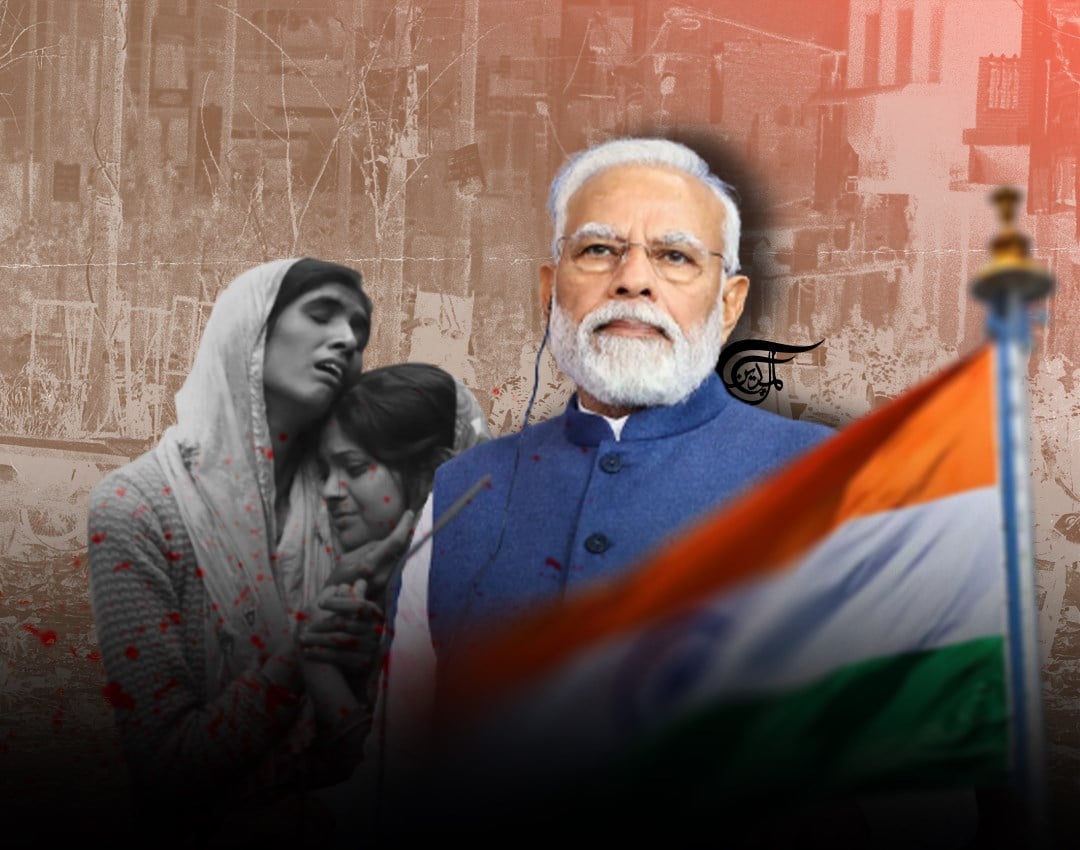Shattering the myth of India’s democracy
The Modi-led government’s push to erase the cultural identity of Kashmiri Muslims is designed to facilitate forced demographic changes and ensure that occupation forces commit to state-backed terror without ever being held accountable.
India’s hard-right Hindu nationalist government puts a premium on sidestepping Muslim minority rights, most recently through state-sponsored surveillance and record-setting internet shutdowns in key areas. New damning evidence of India’s digital rights violations for five years straight reinforces the country’s brand of punitive controls on Muslim minorities, chiefly in the Indian illegally-occupied Jammu and Kashmir (IIOJK).
New Delhi’s cosmetic leadership in the Group of 20 (G20) economies this year conveniently takes a pass on the state of government-backed repression faced by segments of the Muslim population, including through stamping out dissent, targeted digital censorship, and abusing state power to sell impunity for Prime Minister Narendra Modi. Elected premier Modi was the lead figure in the 2002 Gujarat massacre of Muslims.
New Delhi’s emergence as the world leader in cutting internet access with 84 shutdowns (more than half in Indian-occupied Kashmir) is the result of personal opposition to the rights of besieged Muslims and its traction as a state policy. This reflects amply in the formation of new violent militias and their softer faces, such as the Village Defense Group, which is funded by the government and targets Muslims front and center.
The Modi-led government’s push to erase the cultural identity of Kashmiri Muslims is designed to facilitate forced demographic changes and ensure that occupation forces commit to state-backed terror without ever being held accountable. With a sharp uptick in digital censorship, there is a concerted effort to support a climate of impunity by depicting besieged Muslims – not Indian authorities – as the cause of violence at all levels, empowering Hindu nationalist forces in the process.
For a country that insists on the strengths of its institutions, it is a damning site for such sweeping militia formations and freedom curbs to come through without resistance. After all, the Modi-led government is keeping no secrets of its desires to further polarize attitudes toward Muslims in political strongholds. The Hindu nationalist Rashtriya Swayamsevak Sangh (RSS), which dominates the ranks of the serving government, hails Nazi-era fascism at its core and strives to frame every riot as a Muslim riot.
This year’s damning rights revelations arrive at a time when India’s RSS-influenced ruling elite has led violent raids against independent journalists, activists, and major news agencies that have either questioned or called out the government’s treatment of Muslim minorities. It is no surprise that digital rights watchdog Access Now has labeled India as the “biggest offender” worldwide in connection to internet shutdowns that are used as “weapons of control and shields of impunity.”
The West is also responsible for tolerating the sale of Indian authoritarianism under the veneer of democracy. Failures of western allies, including Australia and the United States, range as far as their silence on the constitutional violations against Muslims in India and their fear of calling Hindu supremacist rule for what it is: a threat to democratic values and liberties everywhere.
This week, it was clear that India wants G20 to buy its rhetoric on so-called “deep global divisions” without a word on internal fractures. New Delhi also lacks the spine and transparency to call out a bloody, UN-documented track record of sustaining its illegal occupation at the expense of Muslim autonomy in Kashmir. That brand of military occupation stands consolidated further in view of the digital rights curbs and blatant censorship, as unveiled by Access Now.
Domestic contours of intolerance are equally striking in modern-day India. Look no further than the activation of India’s emergency laws in an effort to blind the public from compelling proof against Prime Minister Modi: a British Foreign Office report concluded that Mr. Modi was “directly responsible” for a “climate of impunity” that triggered the 2002 murder of Muslims in India’s state of Gujarat. To explain away such a block on accountability, documented proof, and criminal proceedings as democratic is unthinkable.
Building off India’s digital rights violations and the ongoing demolition of houses and residences in Kashmir can be lent immediate visibility unless curbs on information, digital connectivity, and press are lifted. New Delhi’s self-defeating strategy of strengthening its occupation at the expense of Kashmir’s self-determination has given way to an enduring resistance that will tear through the artificial projection of Indian "democracy".
To that end, we also see a concerted effort by the ruling government to stop the declassification of key documents that will spill more beans on its illegal occupation and fuel the resistance and its right to self-defense. There isn’t an iota of legal grounding behind such forced controls, making it certain that any opening for Muslim liberties – be it freedom of expression, assembly, information, or movement – is processed as a challenge to Mr. Modi’s aspired Hindu nationalist state.
Taken together, a multiyear track record of world-leading internet curbs, state crackdown against dissent, and aversion to information on Muslims collectively shatters the myth of an "inclusive democracy" in India.

 Hannan Hussain
Hannan Hussain
 5 Min Read
5 Min Read












